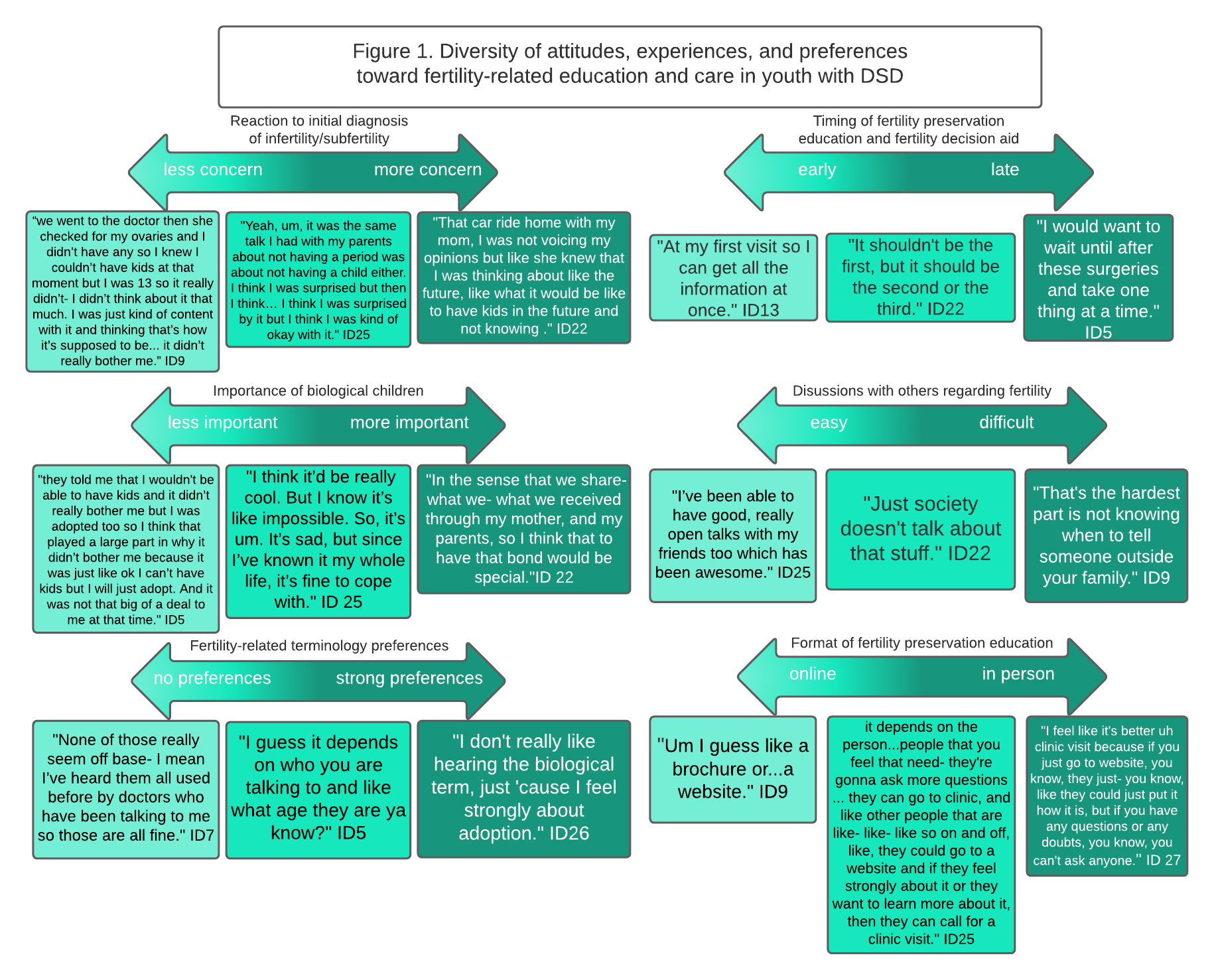Back
Poster, Podium & Video Sessions
Moderated Poster
MP08: Pediatric Urology: Penis & Scrotum
MP08-15: Attitudes toward fertility-related care and education of youth and young adults with differences of sex development: Informing future care models
Friday, May 13, 2022
10:30 AM – 11:45 AM
Location: Room 225
Lauren E Corona*, Josephine Hirsch, Ilina Rosoklija, Elizabeth B Yerkes, Emilie K Johnson, Chicago, IL
- LC
Lauren Corona, MD
Lurie Children's Hospital
Poster Presenter(s)
Introduction: Youth and young adults (youth) with differences of sex development (DSD) face challenging healthcare decisions, including whether to pursue hormonal therapy, genital reconstruction, and/or prophylactic gonadectomy for prevention of malignancy. In addition, fertility preservation is an emerging but experimental option for youth with DSD. Optimal counseling regarding future fertility options has not yet been defined for this population. In this qualitative study, we sought to examine the attitudes toward future fertility and fertility preservation education among youth with DSD to inform fertility-related care needs.
Methods: Semi-structured interviews were conducted from 2015-2018 with youth with a DSD diagnosis who were seen in our multidisciplinary clinic. Topics covered included attitudes toward fertility and fertility preservation-related education. Qualitative content analysis was performed using an inductive and deductive approach.
Results: Eight youth (median age 17 years, range 14-28) with various DSD diagnoses (Müllerian agenesis, androgen insensitivity, congenital adrenal hyperplasia, other 46,XY DSD) participated. Themes encompassed patients’ attitudes toward fertility, perspectives on fertility preservation education, and recommendations for future fertility-related care including preferred terminology (e.g. reproduce, make a baby, have a biological child). Spanning all themes, the following were salient: 1) diversity of attitudes and care preferences amongst participants (Figure), 2) evolution of these attitudes and preferences over time, and 3) an emphasis on individualization of education and care.
Conclusions: The perspectives on fertility and related healthcare experiences of youth with DSD can be used to guide patient-centered education and informed decision making. The results from this study are being used to inform an ongoing qualitative study about fertility preservation decision making in youth with DSD. A flexible and individualized approach can optimize fertility-related healthcare experiences for youth with DSD.
Source of Funding: None

Methods: Semi-structured interviews were conducted from 2015-2018 with youth with a DSD diagnosis who were seen in our multidisciplinary clinic. Topics covered included attitudes toward fertility and fertility preservation-related education. Qualitative content analysis was performed using an inductive and deductive approach.
Results: Eight youth (median age 17 years, range 14-28) with various DSD diagnoses (Müllerian agenesis, androgen insensitivity, congenital adrenal hyperplasia, other 46,XY DSD) participated. Themes encompassed patients’ attitudes toward fertility, perspectives on fertility preservation education, and recommendations for future fertility-related care including preferred terminology (e.g. reproduce, make a baby, have a biological child). Spanning all themes, the following were salient: 1) diversity of attitudes and care preferences amongst participants (Figure), 2) evolution of these attitudes and preferences over time, and 3) an emphasis on individualization of education and care.
Conclusions: The perspectives on fertility and related healthcare experiences of youth with DSD can be used to guide patient-centered education and informed decision making. The results from this study are being used to inform an ongoing qualitative study about fertility preservation decision making in youth with DSD. A flexible and individualized approach can optimize fertility-related healthcare experiences for youth with DSD.
Source of Funding: None


.jpg)
.jpg)